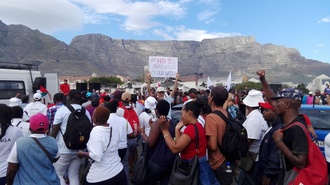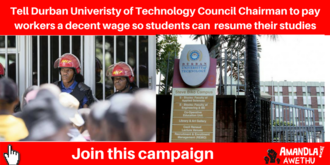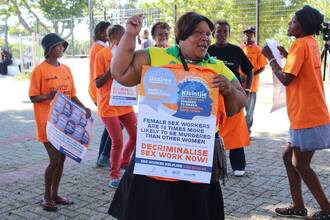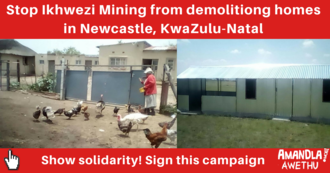- Featured
- Clean air
- Climate justice
- Consumer Rights
- Corporate Accountability
- Data access
- Early Childhood Development
- Economic fairness
- Education
- Electoral fairness
- Environmental justice
- Food justice
- Gender based violence
- Grants/social assistance
- Health
- Housing and infrastructure
- Industry interference
- Land Justice
- LGBTQIA+ rights
- Media/ information access
- Public transport
- Racism
- Reparations
- Safety
- Sanitation
- Service Delivery
- Sexual and Reproductive Rights
- Social justice
- Unemployment
- Womxn's rights/ gender equality
- Workers' rights
- More
-
Tell Telkom to stop stalling #DataMustFall#DataMustFall got ICASA, the communications regulator, to introduce new rules that stop networks from chowing airtime when your bundle runs out, and making your data expire. But 24 hours before networks had to implement ICASA’s the new rules, Cell C made an urgent application to the court to stop the new ICASA regulations just hours before they were meant to be implemented, them. Telkom has also taken legal action. ICASA has pushed back [1], but needs our help in creating public pressure to save millions of Mzansi’s people who continue to be ripped off with high data prices. The people of Mzansi voiced how they were affected by high data costs charged by the likes of Telkom and other service providers. The Independent Communications Authority of South Africa (ICASA), after public hearings, published End-User and Subscriber Service Charter Regulations which were meant to come into effect on 8 June 2018, relieving the enormous data costs we all face. Telkom said they welcome ICASA’s position on the need for fairness in business practice around data pricing and the expiry of data bundles [2]. And we need to make sure that they remain true to their word. Research shows that low income consumers are paying disproportionately high charges, and are not seeing benefits of competition in comparison to high income consumers who are able to buy larger quantities of data [3]. [1] ICASA Notes Cell C's Urgent Application To Review The Eussc Regulations. 7 June 2018. [2] New data rules: MTN‚ Vodacom‚ Cell C and Telkom respond, Adiel Ismail for Fin24. 29 April 2018. [3] Izolo: mobile diaries of the less connected, Research report by Making All Voices Count. 20 Nov 2017. [4] MTN, Vodacom charging up to 2 639% more for out-of-bundle data - report, Kyle Venktess for Fin24. 12 march 2018.183 of 200 SignaturesCreated by Amandla.mobi Member
-
Stop taxing my periodThousands of amandla. mobi members have fought hard to make free sanitary products a reality for millions of girls. Unfortunately, for the households that could put a few rands together to buy a pack, the VAT hike announced earlier this year has made it even more expensive, meaning more people who need sanitary towels could go without. But right now, we have an opportunity to change that. Public submissions to the expert panel investigating the expansion of zero rating to more items was extended. But it ends on June 4, 2018. Send the panel a direct message telling them to recommend that sanitary products are included in the list of essential zero-rated products. People who get periods will buy up to 17 000 sanitary pads or tampons in their lifetime [1]. This basically means that the average person could spend up to almost R40 000 on sanitary pads in that time [2]. This in a country in which over 50% of the population live in poverty. The VAT hike has had an impact on the cost of living in Mzansi. People are spending much more on essential food items, reducing how much they have for other needs. And living a decent, dignified life requires so much more than food. Our community exists to primarily protect us, Black women. You, and over two hundred thousand others have taken action to make this real. And we need you to once again stand with us and make sure the panel recommends dropping the tax on our periods. [1] A guide to 'alternative menstruation': Save money and the world during your period, Pontsho Pilane for Bhekisisa. 31 Oct 2016. [2] Why treasury won't support a fall in the tampon tax, Pontsho Pilane for Bhekisisa. 5 Dec 2016.680 of 800 SignaturesCreated by Amandla.mobi Member
-
24 hours to have VAT removed from more essential itemsBefore the VAT increase kicked in on 1 April 2018, National Treasury had announced that it would set up a panel of experts to consider and review the country’s current list of items that have been zero rated for VAT. We know that the VAT increase has hit the poor and those who rely on social grants, the hardest. National Treasury set up an independent expert panel to look into removing VAT from more items and is calling for submissions. But we have only 24 hours to do this. We can pressure government to review the current list of zero rated items so that we give some relief to poor households. Currently, Mzansi has 19 basic food items on the zero rated list [1]. This includes dried beans, samp, maize meal, rice, milk, tinned pilchards, brown bread, eggs and vegetables, as well as illuminated paraffin. The zero rating does not apply to items such as sanitary products, soap, stationary, margarine and school uniforms to name a few. The poor cannot live off just 19 zero rated items. Many of our leaders seem to acknowledge that the VAT increase is a problem, and we can use this moment to continue to reduce the impact of the VAT hike on the poor, while working towards holding Treasury and Parliament to account. [1] Zero-rated and exempt supplies, National Treasury website. [2] https://www.news24.com/SouthAfrica/News/treasury-calls-for-publics-input-on-adding-items-to-zero-rated-vat-list-201805171,493 of 2,000 SignaturesCreated by Amandla.mobi Member
-
Zara pay back the money to Laduma NgxokoloMa'Afrika, Ours is a history of ongoing exploitation from white monopoly capital, and this time the brand Zara has decided to appropriate Laduma Ngoxolo's designs, by distributing his socks on their website (which they have since taken down). Despite this a small town boy, who worked extremely hard building his business in the Eastern Cape has to utilize his resources to take on an established multi-billion dollar company that tried to rip him off. Since Laduma will have to use his own resources, it is time for South Africans to come together to create a dent in the Zara wallet. Cultural appropriation and exploitation is a tale as old as time, where white capital benefits from the knowledge created in indigenous communities. Boycott all Zara stores in order to send a clear message that we will not tolerate the exploitation of our artists and our people! #BoycottZara #LocalArtMatters #LocalArtistsMatter [1] Press release from Select Committees Chairperson: https://www.parliament.gov.za/press-releases/select-committees-chairperson-welcomes-zaras-decision-remove-copied-designs [2] Press release from MaXhosa by Laduma https://www.facebook.com/MAXHOSA/posts/159243213415892134 of 100 SignaturesCreated by P M
-
Tell UNISA to include Black women on land expropriation discussionWomen in South Africa are more than 50%of the population. The issue of land is important to us as citizens with full rights in this country. Women are also thinkers, opinion leaders and represent an important an essential voice in the discourse about land in this country. It is therefore unfathomable that the panel UNISA has constituted to discuss this issue is male, with one woman panelist. It undermines the views of women in decision-making and excludes a large constituency from a critical debate in the country, consequently treating them as 2nd class citizens. We implore you to desist from this form of secondary Apartheid and victimisation of women. We are equal citizens and our input is not only important but necessary.36 of 100 SignaturesCreated by Lebogang Ramafoko
-
Support the striking Simba workers!As labour-brokered workers under Adcorp Blu, their core demand is to win their right to be made permanent workers of Simba, with better wages and benefits. Parliament changed section 198 of the Labour Relations Act in 2015 to give labour-brokered workers the right to become the permanent employees of the client companies after three months of work. ‘The majority of us workers are women,’ said worker leader Nthabiseng Shai. We want to be Simba people, but we still say Simba must fall!’ The workers are fed up with the way Simba has mistreated them to dodge and undermine the right the law gives them. ‘Some of us have been working here for more than five years,’ explained Shai. ‘They don’t want to make us permanent. They are changing us from a labour broker to another, from Adcorp Blu to FunxionO.’ The workers decided to strike when Simba again changed their employment contracts without consulting them. The Simba Workers Forum is calling on the public to support them. Please contact PepsiCo, the parent company of Simba, and tell them to give the workers permanent jobs: Call the toll free number 0800980063 This campaign is in collaboration with the Casual Workers Advice Office132 of 200 SignaturesCreated by Amandla.mobi Member
-
Tell the City of Cape Town that we reject the budget and privatization of waterCape Town is being used as an international social experiment. Yes there is a drought but 'day zero' is a deliberate lie to justify the rapid privatization of water. The City used a formula that assumed it would not rain; it assumed that it would be windy and hot every day; they failed to consider that large agriculture was abusing water; day zero was flawed from the beginning. Now the international banks are using Cape Town to threaten other cities in SA and the rest of the world, to privatize water. That is why we need to join hands to stop the privatization of water in Cape Town * over 260 000 families (almost half of Cape Town) has already had water management devices forced onto us. * these limit the amount of water that households can use per day * the city aims to change to pre-paid water; in other words, no money, no water; they have already introduced this in parts of Grabouw *currently the real cost of water provision is R6 per kl; the City has increased this by 500% and want to increase it by a further 27-87 %. They want to charge high tariffs for water so the large banks can make pots of money. *the City wants to borrow from international banks for large scale projects such as desalination; the major part of the water budget will go to desalination, about R7.4 bn. In other words, the international banks will make profits out of water. Desalination puts our water into private hands, for profits; desalinated water has caused the death rate from heart attacks to double; it also makes fruit less nutritious. * just as the national govt increased electricity prices by 20% per year, the City wants to do the same with water. * many of the water management devices (over 16%) are defective; they are leaking and shut off, leaving thousands without water for basic needs; * many are getting huge bills of thousands and sometimes hundreds of thousands of Rands. *pressure is reduced in the pipes during the times that people need water; thousands are without water. *the City and other levels of govt knew more than 10 years ago they had to adopt water saving measures such as using recycled water for sanitation; they knew they had to recycle water for recharging aquifers; they knew they had to fix the infrastructure (the City loses 100 million litres per day through leaks). They failed. If we do not stop the privatization of water, the same high tariffs and poisonous desalination will be forced on more communities in SA and around the globe. The next generations will be paying huge tariffs for water. If you have no money, you will have no water. People will die as a result. The City must be stopped. The Water Crisis Coalition is marching to the City and to parliament on the 25th April 2018 at 10am from Keizergracht , at the end of Darling Street, opposite the castle. We want to hand over all signatures and petitions. We invite you to print copies of our petition and to bring them along on the day. Copies can be obtained via [email protected] Some useful references: Proof that Day zero formula was fake: https://drive.google.com/file/d/0B2Fo95AHFCN2bGdGWU1uajRHcDMxVFZUdFFObFU4djhuWFg0/view?usp=sharing Here is the downloadable leaflet which can be used as a free train ticket on the 25th April 2018, for the march. https://drive.google.com/file/d/0B2Fo95AHFCN2aThmWFRrdHZvYUhCNXp0ejFvX3piNHU3eVRZ/view?usp=sharing Joint Saftu-Water Crisis Coalition memorandum handed to the City on our demands on water 12 April 2018 https://drive.google.com/file/d/1xLVvvmRPzUZKJWFBxwGphhGFItJF6W0-/view?usp=sharing Downloadable petition which we will hand over to the Mayor on the 25th April 2018. Why not sign up your community or workplace? https://drive.google.com/file/d/0B2Fo95AHFCN2VVQ0OWYtSGNIWkNDeXVBWk9lcDk5ZFU5MVU4/view?usp=sharing Thesis on some of the 70 springs around Table Mountain https://etd.uwc.ac.za/bitstream/handle/11394/2686/Wu_MPHIL_2009.pdf?sequence=1&isAllowed=y Now the City wants to reduce the collection points for water at Newlands from 32 to 16. Let us march against this madness. Open the springs now. https://m.facebook.com/groups/320668791777159?view=permalink&id=355469214963783 Call by Reclaim Camissa on the need to preserve our springs http://thegreentimes.co.za/calling-government-conserve-groundwater-springs/ Reclaim Camissa site www.reclaimcamissa.org www.facebook.com/RECLAIMCAMISSA/ http://twitter.com/ReclaimCamissa There are a number of other petitions against the budget. We are not in competition with any of them but wish to bring our perspective forward. If you are not comfortable with signing our petition, here is a site which you can consider: https://www.dearcapetown.co.za/coct-budget/3,441 of 4,000 SignaturesCreated by Water Crisis Coalition
-
Tell DUT to pay workers decent living wages and end the strikeDUT staff moral is at its lowest because of the failure by management and the council to resolve this matter in a timely and respectful manner. Staff also deserve a decent salary for their living, it is a violation of their rights when they are ignored by the Vice Chancellor, management and the Council as well. This frustrates staff, and as a result they are withholding their labour and the whole university is badly affected. We want our kids to study and we want staff that will attend to our student needs in a manner that truly affirms that DUT is a student centred university of which right now is not the case. The strike is affecting students in so many ways. One of the students, Sphamandla Gumede, when interviewed by Independent News said, "it makes me very angry. At home they don’t understand why we haven’t started studying. They are thinking I am coming to university to just waste money." https://www.iol.co.za/dailynews/dut-strike-leaves-students-despondent-133006711,933 of 2,000 SignaturesCreated by Nomvula Maneli
-
Decriminalise sex work now! Don’t let this moment passSex work is work, and right now sex workers are calling for solidarity to keep them safe by supporting the call for the full decriminalisation of adult sex work. Some in Parliament support this call and if enough of us make public submissions before the 26th February 2018, we could change the lives of sex workers. Like many other people, Nosipho uses her profession to support herself and her family, to further her studies, to save up for her future and to gain financial freedom and security [1]. But because sex work is criminalised in Mzansi, she and many others, face unsafe working conditions where they face corrupt police who want bribes or rape sex workers in exchange for not being arrested. https://www.youtube.com/embed/dg4l3X9rJHw?ecver=1 This video explains the 4 possible legal models for sex work and why South African sex workers want the full decriminalisation of sex work. Despite the overwhelming evidence showing the ongoing harm caused by criminalisation, the much anticipated sex work report by the South African Law Reform Commission (SALRC) recommends that sex work remains a criminal offence [2]. Now, for the first time in decades, there's a real chance for change. Sex workers and women’s rights groups, like SWEAT and Sisonke, have loudly condemned the report. Parliament's Multi-Party Women's Caucus noted the flaws of the report [3] and the chairperson of the Caucus stressing that the full decriminalisation of sex work is the only model that respects the rights of sex workers [4]. In just a few days, the Women’s Caucus could help determine what the future looks like for people like Nosipho. If we don’t speak out against this horrendous report sex workers may be sent back into danger. There’s only a few days left to make submissions responding to the report. Make sure to send yours through by the 26th February 2018. [1], I am a sex worker: criminalising my work puts me in danger, Nosipho Vidima for GroundUp News, June 14, 2017. [2] Parliament's women's caucus to host sex work summit, Jeanette Chabalala for News24. Feb 9, 2018. [3] Sex work report on prostitution rejected, Nicola Daniels for Independent News. May 30, 2017. [4] Multi-Party Women's Caucus disappointed about law reform commission report on adult prostitution, Ms Masefele Story Morutoa. June 1, 2017.1,001 of 2,000 SignaturesCreated by Amandla.mobi Member
-
Stop the demolition of homes in Newcastle**UPDATE: The Pietermaritzburg High Court ruled today that the families may not be moved to unstable structures. The Hadebe home in Newcastle, Kwa Zulu Natal will be demolished by Ikhwezi Mining on Friday 15 December 2017. The mine is after the coal in the ground. The Hadebe's and 11 other families were represented by the Department of Land and Rural Affairs who have recently pulled out of the case. The Habede family and its community will be headed to the Pietermaritzburg High Court today, 13 Decemeber 2017, without legal representation. The case will be heard and if the mine wins, these families will spend Christmas in unstable iron structures. https://www.facebook.com/groundWorkSA/posts/2236639909695404103 of 200 SignaturesCreated by Amandla.mobi Member
-
Help Icasa ensure data only expires after 3 yearsWe all hate it when data bundles we have bought, are taken away from us after 30 days, or when our data bundle runs out and the networks don't tell us, so it chows our airtime because we are being charged out of bundle rates. Or the fact that those of us who have the least money can only afford small bundles which expire even faster. For too long companies have made up their own rules and ripped us off. But thanks to our Data Must Fall campaign and other voices, ICASA our regulator has published draft regulations that, if implemented in final form, will prevent networks from expiring users’ data for up to 36 months [1]. The likes of MTN, Vodacom, Cell C and Telkom mobile are furious with Icasa, and are crying poor, but we know the truth, and we can ensure people power supports Icasa's bold moves. Icasa is asking for public comment on their draft regulations, the deadline is the 3rd January. We need to cease the moment, and demonstrate enough public support for these regulations, so that these greedy companies don’t find a way to undermine our campaign demands. We need to build on the momentum gained by the Competition Commission launching an Inquiry into the high price of data. For three years our community has fought for justice in many ways. Today, let’s once again come together to ensure that the Competition Commission acts to ensure that network providers don’t profiteer on the backs of those who can only afford the smallest data bundles. Consumers get discounts for purchasing many other basic goods in bulk and pay premiums for buying in small sachets. One of the underlying reasons for these price differences is that it costs more to package and distribute these goods in small quantities. Data is not a product at all. The costs of supplying data reside largely in the billions of rands of investment in the mobile infrastructure and the cable backbone that supports it. How this cost is distributed amongst consumers is in the hands of the operators. In principle there is no reason why data should not cost the same whether bought in small or large quantities. The only additional cost of providing small bundles for operators rests on the billing and associated communication costs. ICASA should demand that operators justify the costs associated with small bundles. At the moment the ratio between the best value package and the worst on Vodacom for 30 day bundles is 1:20 on MTN is 1:29 on Cell C is 1:40 and on Telkom Mobile is 1:10. While we support Icasa’s move to ensure data bundles only expire after 3 years, we only support this being implemented if ICASA ensures companies don’t then remove smaller data bundles that low-income earners can afford, or remove these bundles altogether. Basically, Icasa while ensuring data bundles don’t expire for 3 years, must ensure this does not come at the cost of low-income consumers.1,240 of 2,000 SignaturesCreated by Amandla.mobi Member
-
Sign The Petition:Refurbish Mahwereleng Hotel Into Youthful Creative Lifestyle Hotel&Business CentreAs a community of Mokopane with high levels of youth unemployment, low skills level, major tourism potential, political challenges and also low paying jobs, we need to assist government to save ourselves by creating our own opportunities in partnership with our local state offices by persuading them to support us. We can be the masters of our own visions and future if only we are given the simple support we require Mahwelereng can be internationally great and local community can benefit a lot more from the mines and passing traffic if we are allowed to be more creatives in business and leverage our combined skills away from politics - we can be great.769 of 800 SignaturesCreated by Karabo Songo

.png)
.png)

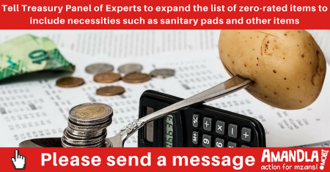

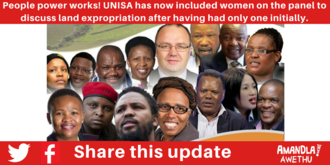.png)
.png)
